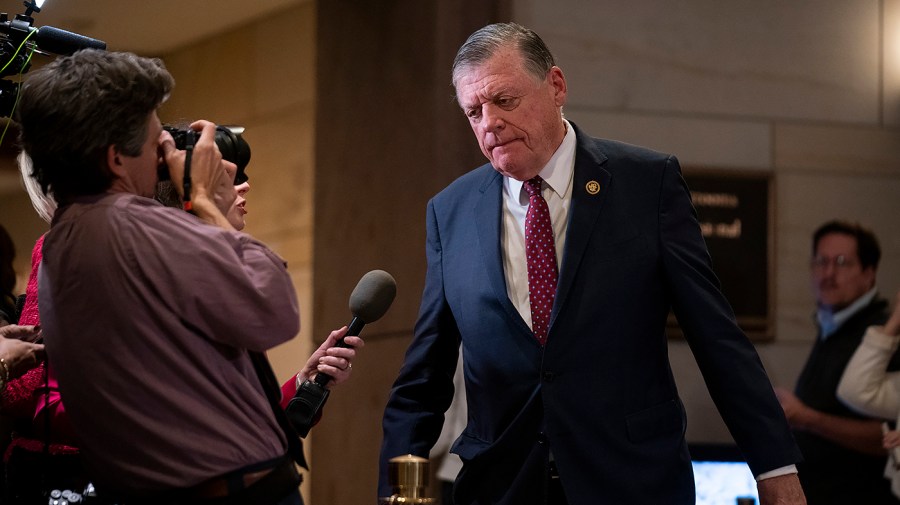Congress has just 10 days until government funding is set to run out, and lawmakers don’t have a deal to keep the lights on during the holidays.
Members on both sides of the aisle expect the government will stay open past the Dec. 20 shutdown deadline. But negotiators are keeping their colleagues guessing about how that will be achieved as funding talks enter a critical stretch.
Negotiators have cited ongoing work assessing disaster relief as a key factor in discussions, as members expect disaster aid to ride alongside any funding stopgap, also known as a continuing resolution (CR), that passes this month.
House Appropriations Chair Tom Cole (R-Okla.) said last week that negotiators have continued to comb through the Biden administration’s “robust” request for more than $100 billion in disaster aid to respond to hurricanes Helene and Milton.
“I’ve said before, they’re very robust. I think they should be. I think we have real disaster,” he said of the proposals.
But while President Biden’s request includes tens of billions of dollars in funding for disaster programs like the Federal Emergency Management Agency, Cole also said he’s not “interested in extra money for programs that are not disaster related, and there’s some of that in the president’s proposal.”
Republicans have singled out funding requests for the departments of State and Education, as well as the Environmental Protection Agency, tucked into the disaster funding request.
Rep. Rosa DeLauro (Conn.), the top Democrat on the House Appropriations Committee, also pointed to the lack of a top-line agreement in disaster aid holding up funding talks.
“There’s not been any real hard-and-fast debates about what’s there, because the issue is, we got to get to a top line, and then we can start to go forward,” she said recently while discussing the negotiations around disaster aid and overall government funding.
Bipartisan calls for leadership to pass legislation for disaster relief have only grown since Congress returned from recess in November, not long after the devastation wrought by hurricanes Milton and Helene.
Cole said Congress could also address the disaster need “as a stand-alone” but noted that leadership thinks “it would help putting on the CR.”
His comments came a day before the hard-line conservative House Freedom Caucus came out against “unpaid” disaster aid legislation, urging “not one more cent to the Biden administration.”
The statement didn’t come as a surprise, as members of the caucus had already expressed reservations about the size and scope of the Biden administration’s disaster aid request. But it signals Democratic votes likely will be needed once more for GOP leadership to move a final stopgap funding bill through the House to stave off a funding lapse before the next Congress is ushered in.
Other items such as IRS funding and dollars for the Social Security Administration could also emerge as areas of focus in spending talks as the pressure dials up on lawmakers with little time remaining in the current session.
Lawmakers are expecting leadership to land on a stopgap that runs through sometime next March, although some Republicans in both chambers have pushed for a CR that ends sooner to push Congress to finish up its funding work faster.
Others are also concerned about taking up too much of President-elect Trump’s first months in office on finalizing fiscal 2025 spending bills.
“My opinion is we should — we should resolve that now, tie a bow on it, not saddle President Trump with it, and certainly don’t distract reconciliation, which is our greatest opportunity to change course on policy, with last fiscal year’s discretionary budget,” House Budget Committee Chair Jodey Arrington (R-Texas) told reporters last week.
“Whatever we decide, we’re going to rally around it, get it wrapped up,” he added. But he cautioned against Congress “dragging all the last year’s problems into the next year, in this new administration and a new Congress.”
While there’s still little more than a month before Trump is inaugurated for a second time, congressional Republicans have already been revving up far-reaching plans to advance the incoming president’s tax and spending agenda come next year.
With slim control of both congressional chambers and the White House, Republicans are eyeing special, but restrictive, budgetary maneuvers that could see them pass sweeping tax policy changes despite expected Democratic opposition in the Senate, as well as a border package in early 2025.
Lawmakers will also have to contend with how to tackle the nation’s debt limit next year. And although another partisan showdown over the nation’s borrowing limit like what Washington witnessed in a divided Congress last year is less likely with a Republican trifecta, there could be some drama as the country’s $36 trillion debt stirs concern amongst fiscal hawks.
There’s also GOP apprehension about putting off funding too late into next year, as the government could be forced to implement across-the-board cuts in the spring if Congress falls too far behind in its funding work.
“It needs to be, certainly before April, or we’ll have, across the board, cuts in defense and an increase in nondefense, which I don’t think is what the Republican conference wants,” Cole said, adding he thinks “the sooner we can get a deal done, the better off we’ll be.”
